
The Football coaching education is a complex, multi-stage process that is regulated by national and international football associations. The education aims to equip coaches with the necessary technical, pedagogical and social skills to successfully manage both youth and professional teams. The following blog describes in detail the different licence levels, the challenges and progress of the education process as well as an international comparison of coaching licences.

In most countries, football coaching education is structured according to a pyramid model. At the bottom are licences for the amateur sector, while at the top are licences for the professional sector. UEFA, the umbrella organisation of European football, provides the framework with its licence levels (UEFA C, B, A and Pro), which is used in most European countries. However, this structure is often adapted by national associations to meet regional requirements.
The UEFA C licence is the entry point to formal coaching education and is aimed at people who want to work at youth and amateur level. Although it is the lowest licence level, the requirements for future coaches are already demanding at this level.
At the end of the training programme, an exam is taken which includes both practical and theoretical parts. In the practical part, a training session with a youth team is usually prepared and carried out, which is assessed by the examiners. The theoretical part deals with basic questions on training methodology and the rules of the game.
With the UEFA C licence, coaches are entitled to work in the youth and lower amateur sector, for example as youth coaches in local clubs. Many coaches use this licence as a stepping stone to gain initial experience and then qualify for the UEFA B licence.
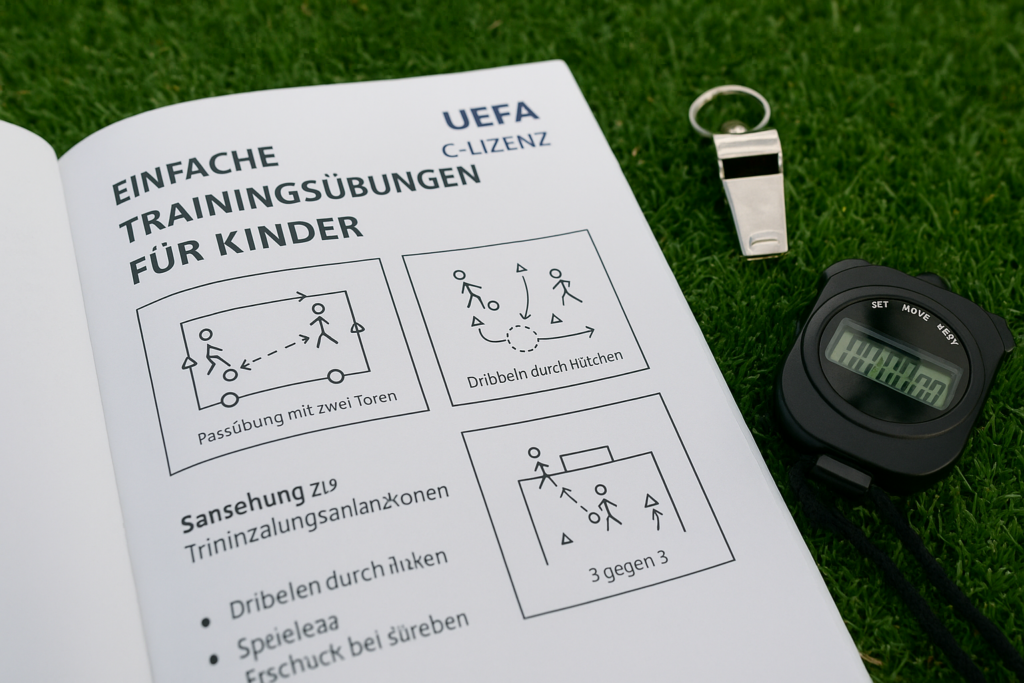
The UEFA B licence The UEFA B licence is the next level and enables coaches to work in performance-oriented youth teams and in the upper amateur sector. It is crucial for coaches who want to work in football more professionally.
The examinations for the UEFA B licence are more demanding than those for the C licence. In addition to theoretical examinations, which cover game systems, tactics and training methodology, participants must also plan and carry out complex training sessions. These are not only assessed by the examiners, but often also by the players who complete the training sessions.
With the UEFA B Licence, coaches can train youth teams at the highest level and take over teams at the higher amateur level. Many ambitious coaches who want to move up to the semi-professional level take this licence.
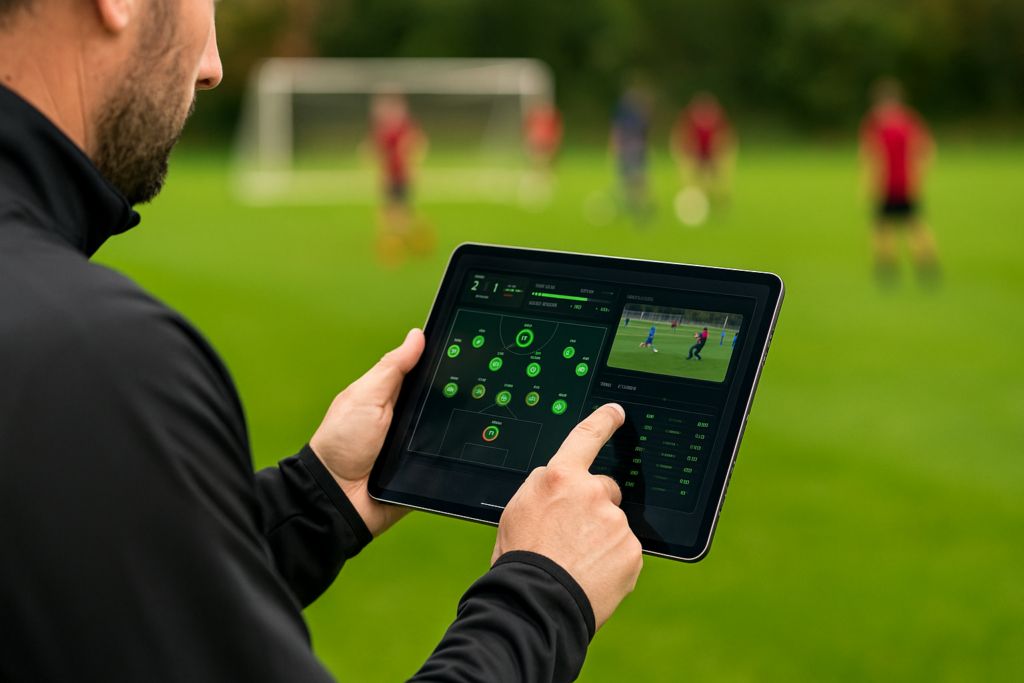
The UEFA A licence is one of the highest licence levels and qualifies coaches for roles in semi-professional and professional football. The complex requirements for training and managing a football team are taught here.
The UEFA A Licence examinations are extremely demanding and include a detailed analysis and development of match and training concepts. Particular attention is paid to the practical implementation of tactical and methodological content in training sessions and matches. The ability to carry out complex match analyses and draw conclusions for training work is also tested.
With the UEFA A licence, coaches can manage teams in the second or third division as well as in the higher amateur sector. The UEFA A licence also offers many career opportunities as an assistant coach in the first division and in international football.
The UEFA Pro licence is the highest qualification that a football coach can obtain in Europe. It is mandatory in order to coach teams in the highest national leagues as well as in international professional football (e.g. Champions League, Europa League).
The examinations for the UEFA Pro Licence are intensive and include extensive theoretical and practical tests. Coaches must demonstrate their skills in real match situations and show that they are able to manage a team at the highest level.
The UEFA Pro Licence is a prerequisite for working as a head coach in the top European leagues or in international competitions. Coaches such as Jürgen Klopp, Pep Guardiola and José Mourinho have obtained this licence before taking their careers to the top of international football.
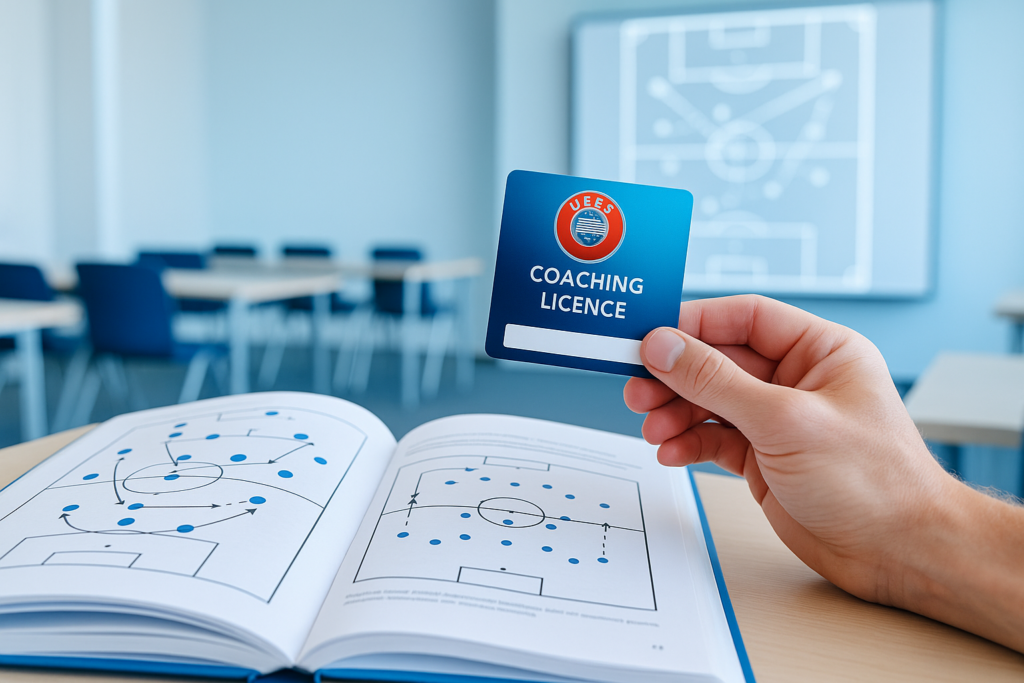
The UEFA C licence is the first level for football coaches
and is aimed at people who would like to work in the children's and youth sector. This training programme teaches the basics of coaching, such as training planning, understanding the game and pedagogical work with children. The UEFA C licence costs between €500 and €700 in Austria and usually comprises several modules and a final examination. Depending on the course offered, the training lasts a few weeks and provides a solid foundation for anyone who wants to get into youth football.
The UEFA B licence builds on the C licence and entitles the holder to coach youth teams in the upper performance range as well as amateur teams. This licence provides in-depth knowledge of match tactics, training design and sports psychology, which are important for performance-oriented teams. The cost of the UEFA B licence in Austria is between 1,500 and 2,000 euros. The training is more intensive and requires more time, as both theory and practice are covered in depth. This licence is for coaches who want to work ambitiously in the amateur and semi-professional sector.
The UEFA A licence is aimed at coaches who want to work in the semi-professional and professional sector. With this licence, coaches can also work in higher leagues and are able to develop comprehensive training plans, implement advanced tactics and shape the individual development of players. The cost of the UEFA A licence in Austria is between 4,000 and 6,000 euros. The course lasts several months and includes extensive theoretical and practical modules such as match analysis, team dynamics and performance-orientated sports psychology. The A licence is a prerequisite for working as a head coach in the professional sector below the top division.
The UEFA Pro Licence is the highest qualification for football coaches and is required for coaches of professional teams at international level. This licence is a prerequisite for working as a head coach in the top leagues and at international level. The training for the Pro Licence is demanding and requires participants to
have comprehensive knowledge in all areas of coaching, from tactical and technical training to management skills, sports psychology and team leadership. The UEFA Pro Licence costs between €10,000 and €12,000 in Austria and the course often lasts more than a year. It includes internships, examinations and extensive theoretical and practical content.
Football coaching education is demanding and involves various challenges. Many coaches have to complete their education alongside normal work life, which requires a great deal of time. The higher licences in particular require an intensive examination of tactics, psychology and management.
The cost of training increases considerably with each licence level. The UEFA Pro licence in particular is associated with high fees, which represents a financial challenge for many coaches. In addition, the time required increases with each licence level, which makes it difficult to balance work and family life.
Many national football associations require coaches to spend a certain amount of time working as a coach after each licence level before they are allowed to tackle the next level. This not only provides valuable experience, but also a certain amount of competitive pressure as many coaches compete for limited positions.
The number of training places for the UEFA Pro Licence is very limited. In many countries, only a few coaches are admitted each year. These places are usually highly competitive and many coaches have to wait years to be able to continue their education at this level.
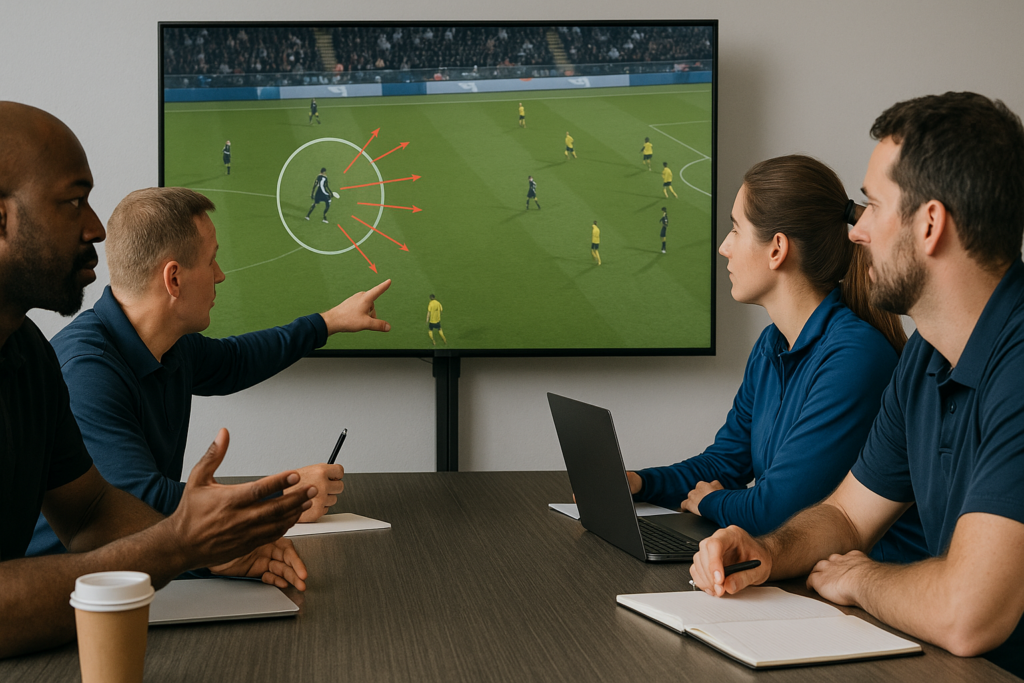
Football coach education has developed considerably in recent years. In addition to the traditional content, new topics are also gaining importance, such as the application of data analysis in football, the role of sports psychology and the importance of leadership and communication. Here are some of the most important advances:
More and more associations are integrating digital tools into coach education. Video analysis, tactical software and data-based training management are now an integral part of the higher licence levels. Coaches must learn to interpret large amounts of data and translate this into practical instructions for their team.
The psychological support of players is becoming increasingly important. Coaches must be able to bring their players not only physically but also mentally to the highest level. This requires skills in communication and conflict resolution, which are increasingly taught in modern training programmes.
As football is becoming increasingly internationalised, many associations attach importance to their coaches being able to compete internationally. Some associations therefore offer transnational training modules or partnerships with foreign football academies.
New technologies are fundamentally changing training and opening up new possibilities for improving performance. Video analysis tools in particular, help to evaluate movement sequences and technique in detail. They enable trainers to provide precise feedback and target weaknesses. In special courses, participants learn how to use these tools effectively, edit recordings and optimise training results. In this way, the combination of technique and knowledge becomes a valuable building block for success in training.
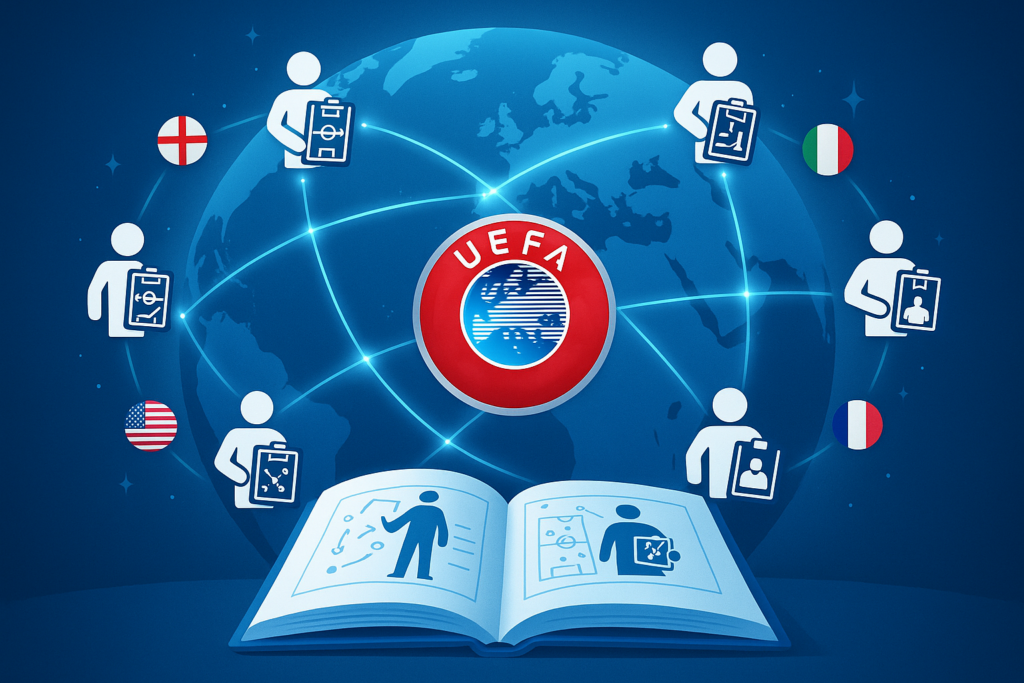
While the UEFA licensing structure is largely standardised in Europe, there are differences in coach education around the world.
In Austria, too, coach education, is organised by the Austrian Football Association (ÖFB), is also closely aligned with the UEFA guidelines. The ÖFB attaches great importance to sound training that takes into account both tactical and pedagogical aspects and enables a permeability from the grassroots to the top level. The training often takes place in the regional association sports schools and increasingly integrates modern approaches such as Video Analysis and sports psychology content in order to prepare the next generation of coaches for the diverse demands of national and international football.
In Germany, education is organised by the German Football Association (DFB) and is highly structured. The DFB Academy in Frankfurt is regarded as one of the most advanced training centres in the world. Particular emphasis is placed on the training of young coaches, and Germany has developed a strong network for youth football in recent years.
In England, the Football Association (FA) is responsible for coach education. There are strict entry requirements, particularly for the UEFA Pro Licence. English coach education has modernised considerably in recent years, particularly in the areas of sports science and data analysis.
In the USA, football coach education is regulated by the US Soccer Federation. The focus here is strongly on the development of youth football, and coach education is closely linked to the university system. The licence structure is based on that of UEFA, although the requirements are more flexible, which makes access easier.
In South America, particularly in Brazil and Argentina, coach education is less structured than in Europe. Many coaches rely on their own experience as players and acquire their licences parallel to an active football career. Even though associations such as CONMEBOL are attempting to formalise education, practice in South America is often strongly influenced by individual experience.
Football coach education is a complex and demanding process that ranges from grassroots amateur level to professional football. Education is characterised by high demands in terms of time and costs, but also offers many advances in the areas of tactical knowledge, psychology and technology. An international comparison shows that the UEFA licences are largely regarded as the standard, while other continents go their own way.
The challenges along the way are great, but with the right support and a clear goal in mind, ambitious coaches can advance their careers to the professional level.